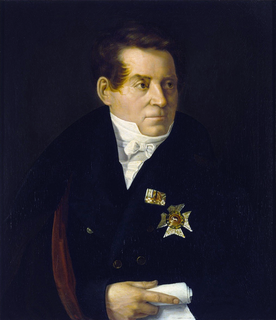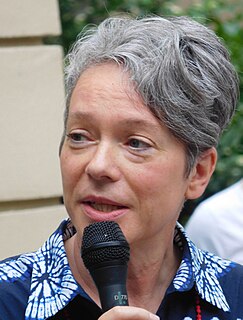
August WilhelmSchlegel, usually cited as August Schlegel, was a German poet, translator and critic, and with his brother Friedrich Schlegel the leading influence within Jena Romanticism. His translations of Shakespeare turned the English dramatist's works into German classics. Schlegel was also the professor of Sanskrit in Continental Europe and produced a translation of the Bhagavad Gita.
Thomas Hürlimann is a Swiss playwright and novelist.
The Goethe Prize of the City of Frankfurt is an award for achievement "worthy of honour in memory of Johann Wolfgang von Goethe" made by the city of Frankfurt am Main, Germany. It was usually an annual award until 1955, and thereafter has been triennial. Following a decision of municipal authorities in 1952, the "Award of the Goethe Prize" only takes place every three years. Many recipients are authors, but persons working in several other creative and scientific fields have been honoured. The prize money is €50,000.
The Kleist Prize is an annual German literature prize. The prize was first awarded in 1912, on the occasion of the hundredth anniversary of the death of Heinrich von Kleist. The Kleist Prize was the most important literary award of the Weimar Republic, but was discontinued in 1933.
Pauline Gotter was the second wife of Friedrich Wilhelm Joseph Schelling and a friend of Louise Seidler and Sylvie von Cigars.
Jakob-Wassermann-Literaturpreis is a Bavarian literary prize. It is granted in honour to the famous German-Jewish writer Jakob Wassermann by the city of Fürth and comes with a donation of 10.000 Euros.
Droste-Preis is a literary prize awarded in Baden-Württemberg, Germany. The city of Meersburg awards the Droste Prize in memory of the writer Annette von Droste-Hülshoff, who spent the last years of her life in Meersburg. It is awarded every three years. The award is endowed with €6,000. The award is only given to women.
Rheingau Literatur Preis is a literary prize of Hesse. It is awarded annually since 1994 by the Rheingau Literatur Festival which follows the Rheingau Musik Festival. An author is awarded whose prose gained the attention of the literary critics
The Aspekte-Literaturpreis is awarded annually for the best debut novel written in German, as judged by a panel of writers, critics, and scholars. The prize is sponsored by the ZDF television network through its arts program, Aspekte. It is valued at 10,000 Euros. Past recipients include Georg Büchner Prize-winner Felicitas Hoppe and Nobel Prize-winner Herta Müller. The award was established in 1979.
Joseph-Breitbach-Preis is a literary prize awarded by the Akademie der Wissenschaften und der Literatur Mainz, in Germany and the Joseph Breitbach Foundation. Established in 1998, the prize is worth 50,000 euros and is awarded annually in Koblenz, birthplace of writer Joseph Breitbach (1903–1980), for whom the prize is named.
The Nicolas Born Prize, awarded by the German state of Lower Saxony, is a literary prize given since 2000 in honour of the writer Nicolas Born. It is awarded to notable German-language writers from Germany, Austria and Switzerland. The main prize is currently 20,000 Euros, and since 2015 a further 10,000 Euro prize has been awarded to a debut author.

Ina Hartwig is a German writer, literature critic and academic lecturer. From July 2016, she has been Kulturdezernentin in Frankfurt, the city councillor responsible for culture and science.
Christoph Dieckmann is a German journalist, commentator and author. Before 1990 he grew up and, as a young man, built his career in the German Democratic Republic : much of his most thoughtful writing continues to relate to those times, along with the tensions and frictions that still resonate from the division of Germany between 1949 and 1990.
Romelia Lichtenstein, also Romelia Assenowa-Lichtenstein is a German opera, operetta, oratorio, lied and concert soprano. After an apprenticeship as children's nurse she studied vocals at the University of Music and Theatre Leipzig. In June 2012 she was appointed Kammersängerin by the city of Halle.
The Fontane Prize of the City of Neuruppin was donated in 1994 on the occasion of the 175th birthday of Theodor Fontane from his native city of Neuruppin.
The Hildegard von Bingen Prize for Journalism is an annual journalism award. Since 1995, it is awarded by the Board of Trustees of the Hildegard von Bingen Prize. Former award winners are members of the Board of Trustees. The award was founded in 1995 by the biographer and journalist Helmut Ahrens. A publicist is honored "for an outstanding, professionally and culturally important journalistic individual achievement or a life's work." The prize money is €10,000. The award is named after the medieval abbess Hildegard von Bingen.
The Franz Nabl Prize is an biennial Austrian literature award. The prize was first awarded in 1975 by the city of Graz. The prize money is €14,500. It is awarded as part of a jury meeting in cooperation with the Franz Nabl Institute for Literary Research at the Karl Franzens University of Graz.
The Uwe Johnson Prize is an annual German literary award. The award is named after the writer Uwe Johnson (1934–1984) and was first awarded in 1994. It is awarded for "outstanding literary works in which there are links to the poetics of Uwe Johnson". Alternating the main prize for a work and the Förderpreis for the best debut is awarded by the Mecklenburg Literature Society, the Nordkurier (1994–2016), the Berlin law firm Gentz und Partner and the Humanistischer Verband Deutschlands. The prize is endowed with €20,000.

Ursula März is a German author and literary critic-commentator.



